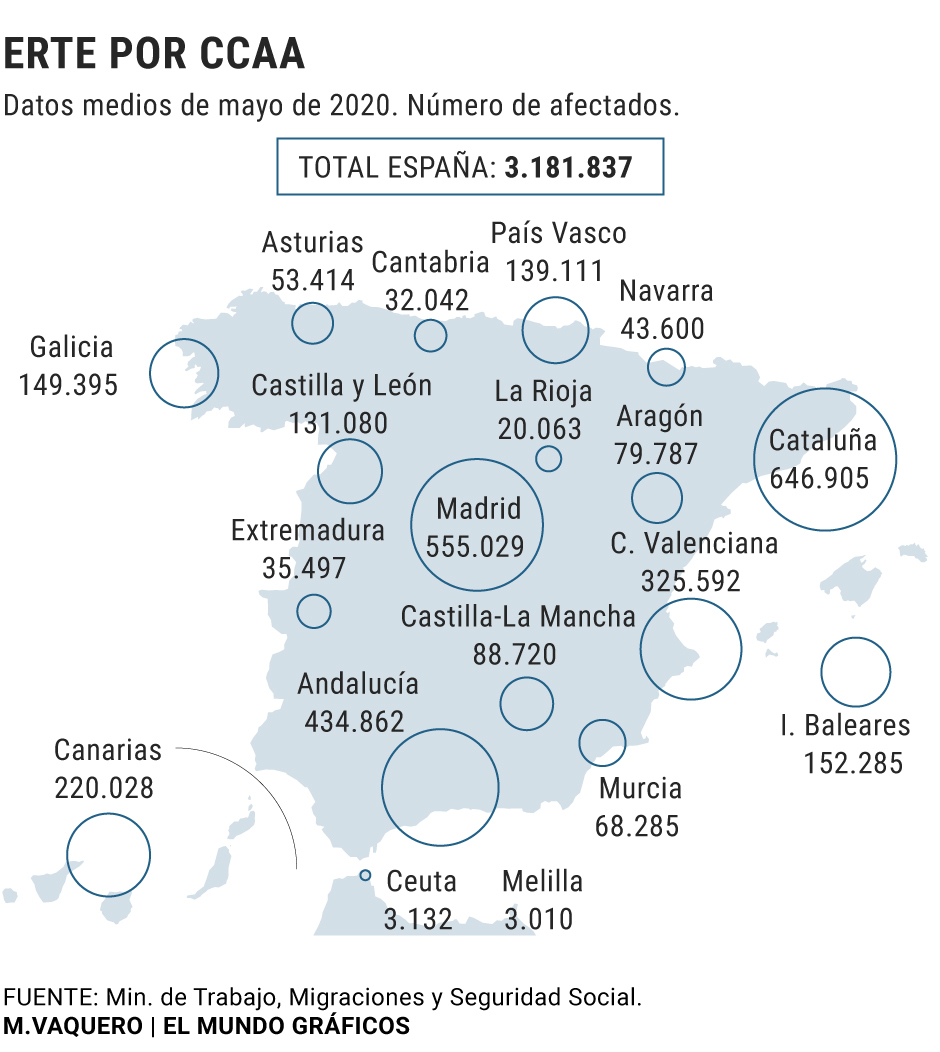- Politics. Sánchez draws idyllic management of the pandemic and asks to extend the alarm while Casado accuses him of "leaving the State on the scrapes"
- De-escalation. 133,000 companies disappeared and one million temporary contracts extinguished: reconstruction begins
The temporary employment regulation (ERTE) files that have served as a cushion to resist the economic impact of the coronavirus will in all likelihood last until December, although in conditions different from their current scheme. Yolanda Díaz, Minister of Labor, has agreed today with employers and unions on the advisability of extending its term, which expires on June 30.
UGT and CEOE yesterday advanced their support for this possibility. And Díaz has affirmed today that "without a doubt" it is open to the ERTE being able to extend until the end of the year in those sectors that need it.
"Today there is evidence that the company and the workers want them to extend further. As soon as the tasks of the intersectoral commission are completed, we will have a roadmap to find out which sectors need this support beyond June 30," he said. explained the minister in statements to RNE.
The current ERTE scheme exempts companies from paying contributions and gives workers a subsidy of 70% of their salary that does not consume unemployment rights . In total, the set of benefits recognized by Labor has risen to 5.98 million with an invoice of 5.1 billion in May alone, plus another 4.5 billion in April. Payments to those affected by ERTE have been the Achilles heel of this scheme since the Public State Employment Service (SEPE) has not paid benefits on time to hundreds of thousands of workers . The Government denies this point, assuring that it pays 98% of the benefits, although SEPE workers have been opposed to opening the offices to the public for weeks until the subscriptions are in order.
Díaz has stressed that the ERTE have protected more than three million workers, most of them with permanent contracts. Temporary jobs, however, have not resisted the closure of activities and have ended in unemployment.
The head of Labor has referred to the difficulty now facing the transition from this total protection scheme to another linked to requirements and conditions in certain sectors, geographic areas and companies with the clause that penalizes dismissals for six months, that is, until December.
Díaz recalled that in Germany and Italy these schemes have protected more than 10 million and almost eight million workers, respectively, and that there is no debate about how many ERTEs will end up becoming ERE, as proposed by the CEOE employers. and Cepyme. More than 133,000 companies have disappeared in the last two months and employers indicate that they will disappear more if they must carry contributions and payrolls without recovered activity .
"It saddens me that these formulations are made (...) The company is committed to maintaining employment for six months," recalled the minister, who stressed that there are already 400,000 people who have left the ERTEs to rejoin work activity.
As he has been repeating for more than a month, Díaz has stated that, today, the unemployment benefits recognized in the ERTEs are "practically paid" and he specified that there are 2% of procedures that show some type of defect in its processing.
On whether the unemployment bill is sustainable, which has led to a record figure of 5,121 million euros, the minister stressed that "what would not be sustainable" is to have people without unemployment protection.
"We workers are contributing to have unemployment protection and, of course, it is sustainable to unfold an intense tide of protection. (...) Nobody in Europe questions whether this is sustainable or not. We have no doubt that this is the right thing to do. when the workers need it, "he defended.
The minister did not want to make "future" about how much unemployment could rise in this crisis and limited herself to pointing out that it is far from the figures that were reached in "previous mandates" (27.2% in 2013) . "Hopefully we do not reach these figures for the good of our country," he added.
In accordance with the criteria of The Trust Project
Know more
